|
Alton Papers etc.
My Shadows
When the clock of night is falling, and the earth is wrapped in gloom,
Then to me sweet voices calling, echo round the peaceful room;
Closed the door and drawn the curtains, dying ashes palely glow,
As the footfalls, faint, uncertain, viewless wander to and fro.
All the house is hushed and quiet, for the day-time stir is o'er,
E'en the very mice run riot, noiseless o'er the pantry floor;
Not a sound except the embers, lightly falling from the grate,
And the wailing of December's, homeless wind that wanders late.
Through the hush comes voices ringing, clear above the wintry blast,
And a ghostly band is bringing back to me the buried past;
One by one each chair is filling as the shades flit here and there,
And I seem to feel their thrilling, unseen touches stir my hair.
Comrades loved when youth sat smiling, on my smooth unwrinkled brow,
With their accents sweet beguiling, gather in to charm me now;
Friends of riper years who perished, at their work as time sped by,
Bring again those features cherished, through my life's maturity.
Gold and grey and russet tresses, lean against my faded chairs,
Friendship's words and Love's caresses, witch away all worldly cares;
Dear remembered tones are stealing, back from out the unseen lands,
Aching wounds are slowly healing, 'neath the touch of tender hands.
I can watch them through the closing, of my lids that weary droop,
I can note the calm reposing, of that strange familiar group;
I can hear their soundless turning, when they move to smile at me,
And my soul goes out in yearning, for the loved I seem to see.
O my shadows! when ye vanish, with the night that flies at dawn,
All the sorrows that ye banish, hasten back as hastes the morn;
Swiftly wintry gleams come racing, and my darlings may not stay,
For the shafts of light are chasing, all the gentle ghosts away.
Hark! the timid mice are making, off to homes beneath the floor,
As upon the silence breaking, busy life begins once more,
And my hands go vaguely straying, where the shadowed heads had lain,
While my silent lips are praying, to re-meet my Dead again.
L. E. Cuppage
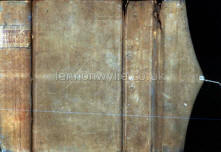 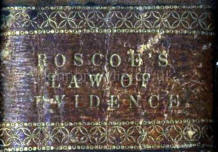
  
1831 - 26th October Roscoe's Law of Evidence Samuel Rankin, Tiernaleague,
Carn.


1888 - Miscellaneous writings, etc. of E.H.A.
1. His first (?) Term Report from High Street
(Oct. 1888)
2. His first (??) Contribution to Classical Review (with comment by Postgate)
on The Zengma in Horace Egarde?
3. An article on Mithraism?, Irish Church Quarterly (?)
4. "Ovid in the Mediaeval Schoolroom" paper to Classical Ass?? (? of
Ireland)
5. On Diocletion (? a popular lecture)
1) High School, Dublin, Form 5, E. H. Alton's
Report for Tern ending October 1888, Average Mark at English Lessons, 75 per
cent. Mathematical 74%, Classical 78%, French 77% German -, Drawing -.
Conduct in School -, Remarks, Always losing and mislaying his books.
Otherwise very promising. ? look forward to the High Street Exhu? in T. C.
D. - Thomas W. Foster, Form Master; M.A., W. Wilkins, M.A., Head Master
1903 - 24th November Pre' Mill House, St. Albans - Dear M. Matz, I
must thank you for your kind note of sympathy. A? say, it was a trying time
for those who watched at the bedside, day and night, until the end came.
Happily there was no suffering which is a great consolation to us. I am
sorry to hear that H. F. Dickens cannot give his reading on the night when
it will be my privilege to preside. This was an honour to which I looked
forward with great pleasure. Have you secured a lecturer in his place?
Perhaps Mr. Spechmann could be induced to oblige. I had a chat with him last
night, and he expressed a hope that he would be able to read a paper during
the present session. I am pledged to dine with Dickens and Bur??nd at the
Garrick Club on Thursday night, and shall feel more at home now they have
joined the ranks of the Fellowship. Will you kindly send me a copy of the
booklet containing the New Rules, - also a copy of the statement re H. W.,
for my collections. Stamp enclosed. Have you done anything more on the
matter of "Dickens and his Illustrators" and the theatre copies, or did the
scheme fall through? With kind regards, Yours sincerely, F. J. Kitton
(Newspaper Clipping) When Lord James of Hereford, who is the Vice-President
of the Dickens Fellowship, asked the public for £300 for the purpose of
establishing a memorial to Charles Dickens, his object was not made quite
clear. It appears that the idea is to purchase the well-known collection of
books with a "Dickens interest" of the late Mr. F. J. Kitton. It is thought
that such a purchase would be well within the constitutional objects of the
Dickens Fellowship which now boasts of over £5000 members. Its surplus funds
are spent in good objects and in the interests of humanity.
1918 - 23rd May, Reprinted from the "Irish Times" - With the Grand Fleet. A
Wondrous Spectacle
An Irishman's Impressions (by Our Special Correspondent) E. H. A. - "Will
the German Fleet come out?" Not if they can help it! And to us, who have
seen the Grand Fleet, this unGerman self-effacement appears, i? unheroic, at
least extremely prudent. "There be land rats and water rats, land thieves
and water thieves." The Kaiser may exult over the advances of Kultur by
land; but to-day there are no water thieves, and the number of water rats is
dwindling. That Germany has no place on the waters is due to the British
Fleet and its Allies. Over the seven seas has been cast a net, vibrant and
living: its terminals touch the German coasts, and announce to the Grand
Fleet, the heart of the wonderful system, every movement of the enemy as he
writhes in impotence. Our party, under Lieutenant J. C. Percy, arrived at
___ Hotel in __ __. There we were welcomed by an officer whom the Admiralty
had appointed to act as guide. On the following morning we were brought by
motor car to __ Pier, where we met Lieutenant S__, who informed us that he
was ordered to take us for a tour through the Grant Fleet. We went on board
a fast patrol boat, commanded by a Lieutenant in the R.N.R., who combined
naval and Scottish traditions of hospitality. As we swept out to the Fleet
we studied the mysterious depth charges and the quick-firer with which our
craft was armed. But these trifles were forgotten as the immensity of the
Grand Fleet began to reveal itself. Ship after ship, line after line, we
passed, and there was no end. Lieutenant S__ names this one and that one,
and gave us snatches of their story. There were cruisers from the Falklands;
there were cruisers that had chased and destroyed the fugitive remnants of
the Kaiser's Navy in the South Seas and in African waters; there were
monsters whose thunders had shaken the hills at Gallipoli, whose lightnings
had blasted the Germans at Jutland; and there were others with stranger
histories. "That is the Cat," said our guide; "according to Herr Wolff it
has been crippled once and twice sunk." "It does not seem much the worse."
"No, and the only time they sank it, or what they thought to be it, the
whole crew floated off on the aft turret." The Kaiser, with Herr Wolff,
should some day be invited to attend a review of the battleships that his
Navy has sunk, and be presented with a medal to commemorate their
resurrection. THE IMMENSITY OF THE FLEET. Among the cruisers we
noticed the finest ships of the American Navy, easily distinguished by their
lattice masts. They gave us Irishmen a very welcome testimony to the
whole-hearted determination of our great Ally. We had met on the previous
evening an American staff officer, who told us, with modest pride, of the
efforts that his country had made, and was making. I cannot mention details;
but America is "all in," and America's "all" is some "all." Our eyes were
tired by the multitude of heavy and light cruisers, flanked by swarms of
smaller craft, destroyers and submarines, of types familiar and unfamiliar.
When we had reached at length, as we thought, the end of the Grand Fleet, a
receding headland began to reveal to us a still greater fleet of heavier
ships. High in the air swung a row of observation balloons, which watched, I
am sure, with suspicious eyes our civilian selves as we rushed down the
lines of grim monsters, and listened to a fresh roll of names, names that
are golden in the annals of the Navy. There seemed no end. We were dumb:
curiosity and admiration were swallowed up in stupefaction. Before we had
seen a fraction of these lines, it was time to turn, and we raced back to
the __ where the Admiral of the First Battle Squadron had invited us to
luncheon. I think that we all felt somewhat shy that morning at the prospect
of obtruding our civilian unworthiness on the great ones of the sea. But our
young friends on the launch had said much to reassure us, and we plucked up
heart as we came alongside. The youngest member of our party set his
yachting cap at a Kettle angle, and gave a twenty-one gun salute to the
sailor that supported our steps to the companion ladder. The Admiral,
himself an Irishman, welcomed us, and the genial kindliness of our hosts
made us feel quite at home. We discussed many things naval, dicenda tacenda,
and learnt why certain subjects must remain in darkness till the war is
over. THE NAVAL AEROPLANES. Leaving the __, we paid a visit to the __; there
we inspected the great turrets, the engines, the quarters of officers and
men. We were behind our programme, so our scattered members were summoned,
and appeared, some from man-holes, down which they had lost themselves;
others from the ward-room, where a Home Ruler and an Ulsterman were
explaining simultaneously the one and only way of settling all Irish
difficulties. When we has reassembled, we were taken to the __. Here we
watched aeroplanes fluttering down like leaves, over and over: nose spins,
side-slips, looping the loop, all the "stunts" that prove the mastery of the
air, were exhibited to us. I saw a lad with the ribbon of the Victoria
Cross. I asked a brother officer for details: "Oh, one of our chaps was shot
down during a raid. X. saw him on the ground, descended, and picked him up,
and got off before the Germans could reach the spot!! It's a way they have
in the R.A.F. It seems a pity that the Government, in their scheme for
amalgamating the two branches of the Flying Service, have not seen fit to
retain the naval uniform for the naval flying man. Sentiment is an important
thing. Men give their lives cheerfully for a piece of cloth, provided it is
dyed the right colour. Perhaps, the Government may yet reconsider their
decision, before some poet sings the "Wearing of the Blue." We saw
aeroplanes dismantled and reassembled in the space of a few minutes. We
learnt much about scouts and bombers. We understand - or think we do - many
things that have puzzled the long beards of Kiel. But regarding these
matters "a mighty ox is on our tongue" now and for the duration of the war.
A HOROSCOPE. We had afternoon tea on board the __. This vessel is proud of
its honourable scars. A huge lump of steel, knapped from a turret by a
Jutland shell, is carefully varnished and lashed to the mizzen. And we
learnt that the ship has a horoscope, drawn by the wise men of New Zealand.
Two of the three great events predicted have come true, and in the next and
greatest fight it is said that only damage that the ship shall suffer will
be to a particular turret. I asked my informant where his post would be on
that great day. "I command that turret," was his reply. He smiled, and I
know he hopes to set another giant medal of steel beside the one which at
present adorns the mizzen. Before we left a number of the crew danced and
sang the Maori war song with a verve and realism that stirred strangely our
blood, and roused the Demosthenes of our party to make a speech to the
ship's company. We were sorry to leave. There was a large number of Irishmen
among the crew, and the captain, the kindest of hosts, hails from County
Cork. Our party was distributed for the evening among the different ships of
the First Battle Squadron. Lieutenant J. C. Percy and the writer were
assigned to the finest ship of the squadron. Of that we both are convinced,
though, on comparing notes with our other members, we discovered that each
was equally obstinate in holding that his particular ship and his hosts were
the best in the Navy and in the world. More pleasant or considerate hosts we
certainly could not have had. Before turning in, we took a stroll on the
quarter-deck, and looked at the Grand Fleet stretching in silent majesty as
far as our eyes could see. No lights were shown on board the ships, but from
time to time Morse signals stabbed the dusk with dazzling question and
answer. That picture of the Grand Fleet at dusk, lying in quiet
watchfulness, is one that is not easily forgotten. THE BIG GUNS. Next
morning we had the honour of breakfasting with our captain. I should not, I
know, call him "our captain," but that is how we felt and feel towards him.
After breakfast we went on deck for divisions. The ship's company was
paraded, and, the chaplain being absent, the captain read prayers. The hymn
was "Rock of Ages." I was never at a Service which breathed a truer spirit
of reverence and solemnity. Sailors seem at such moments to draw nearer to
God than landsmen do. After this Service, the whole company were exercised,
at first at the quick step, then at the double. The massive bulk of the ship
quivered beneath the rhythm of their feet as officers and men raced in file
up and down all over the ship. After the strenuous exercise, the company
dispersed, each unit to its particular work. We were conducted over every
part of the ship, visited kitchens and bakeries, hospital, stores,
engine-rooms, forges, electricians' and carpenters' shops. Everywhere the
latest machinery, and every device that could contribute to efficiency or
eliminate waste. Even the refuse from the kitchens - potato peelings and
scraps - is carefully collected, and sent to shore to feed farm animals. We
saw the men's quarters, reading-rooms, and bathrooms. We descended to great
depths in lifts to the regions of the engineers. But we were, I think, most
interested in the great guns. We learnt how they are sighted, controlled,
and synchronised. No one who has been in a turret can fail to be impressed
by the ease with which the monster guns are moved, loaded, and fires. A mass
of nearly a thousand tons swings round smoothly in obedience to a lever that
a child could move. We saw the process of loading. The gun hisses like an
angry dragon. That was, we were told, the noise of compressed air sweeping
the breech of débris, sparks, etc. The breech turns and swings back,
and up from the bowels of the ship rushes a huge steel box, holding the
shell and the charges. The shell is thrust into the breech by an arm of
steel, which uncoils and recoils itself in a flash. When the charges are
rammed home the breech is closed, the loader disappears with a clatter, and
all is ready. It was news to us that the noise of the explosion is hardly
heard inside the turret. From the turret we visited the magazine, and there
we found the same ingenuity of contrivance. All that morning was spent in
examining the ship, and we had not time to see half its marvels. One thing
we landsmen found unsatisfactory - the method of ascending and descending.
The steel ladders were vertical, and the hatches at times disagreeably
narrow. At times, when the passage-ways were hardly adequate to men of our
bulk, we felt like mice struggling in the works of an eight-day clock. Yet
our guide and his men never collided with a single stanchion or hatchway.
THE GREAT ADMIRAL. Admiral Beattie had expressed a wish to see our party,
and we were, indeed, fortunate. We saw our great Irish Admiral in his cabin,
heard some nice words of appreciation of the services of of Irishmen in the
Navy, and had the honour of shaking the hand of the forefighter of Jutland.
The Commander-in-Chief, Coast of Scotland, had honoured us with an
invitation to lunch at the Admiralty House. There we met a very gracious
hostess and a most interesting company, many of whom have made their mark in
the present war. One of my neighbours told me much about the work of the
Navy at Gallipoli: some day the public will know the details of that sad,
but heroic, episode. One of our party was a collector of autographs, and I
was struck by the motto that one of the company wrote above his signature -
"Drive on, drive on; there is a long eternity of rest." In those lines lives
much of the naval spirit. We took leave of our host and hostess with
reluctance, but we were behind our programme, and we had much to see that
day. We were taken from the Admiralty House to __. Three or four years ago
it was largely waste and slobland; to-day it is a base worthy of the Grand
Fleet. Dry docks and huge basins, great stores and shops of all sorts,
railways and tramways - it is almost incredible that this great working city
could have come into being during the war. Admiral __, who took us round in
person, was a cheery volcano of facts. His mind seemed as well ordered and
as well supplied as the great hive of industry over which he rules. Another
great creation of the war is the destroyer base, with its countless piers
and neighbouring workshops and stores. Truly, the Admiralty have nothing to
learn from our American Allies in the art of hustling. We saw other marvels
and other cities which have sprung up in this night of war. But the tale is
endless. It was the Grand Fleet that we went to see, and it was from the
grand Fleet that we learnt most. Its watchword is efficiency, its
temperament is confidence. "You won't find a pessimist in the Navy," said
Admiral __. And we did not. E.H.A. - Printed by the Irish Times, Ltd.,
Dublin
1921 - 17th August, Department of Agriculture and Technical Instruction for
Ireland, National Museum, Kildare Street, Dublin, Telephone: Dublin 15 X -
My Dear Alton, I don't think I ever gave you my book on Irish seals; now
many years old. I have just come upon a copy, which please accept. The
subject is not one in which you are interested; but Irish books of all kinds
sometimes come in useful. The book has been out of print for years.
1928-29 - Mr. H. Poë Alton, Local Director, Barclay Bank, 44 Beaver Street,
New York
(Dominion, Colonial and Overseas)
Barclays Bank, Canada. The shareholders will probably have seen in the Press
announcements to the effect that application is being made by Barclays Bank
Limited for a charter for the conduct of business in Canada. It has been
felt for some time that in order to protect adequately our old-established
interests in the West Indies it would be advisable to arrange for direct
representation in Canada. This step has appeared to be specially necessary
in view of the steadily increasing trade between Canada and the West Indies.
The capital of the new company will be £500,000, with a published reserve of
a similar amount. The head office will be in Montreal, and the Right Hon.
Air Robert Borden, G.C.M.G., has accepted the chairmanship of the board of
directors, which will also include the Hon. Louis Alexandre Taschereau,
LL.D., LL.L., M.P.P., Mr. Arthur Blaikie Purvis, Mr. Herman Poë Alton, our
local director in New York, and Mr. Julian Stanley Crossley, who is a member
of our South African London committee. There will also be a London committee
in connexion with the affairs of the new company. A brief report
relating to matters of special interest in the various areas where our bank
is represented will be circulated for the information of share holders,
together with a copy of the report of the proceedings at this meeting. There
will also be circulated a copy of my address to the shareholders of Barclay
Bank at the annual meeting which has already taken place to-day. The
Chairman concluded by moving the adoption of the report and accounts.
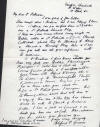
1931? - 10th April not even going to attempt to read this scrawl, its to a
D. Patterson (I think) from Alfred P. Graves, North Wales (I think)

Henry Gordon Alton from Father, Xmas 1935




1935 - 27th December As regards my books, I think it will be best to
ask some bookseller to make an offer for the Classical ones. Perhaps B. H.
Blackwell of Oxford would be the best firm to ask. No Dublin firm would give
anything like a decent price. They should fetch at least £300; some idea of
their range and value may be obtained from the slip catalogue (in the
cabinet I made myself) But that catalogue is far from being exhaustive. Many
very valuable items on the shelves at Dartmouth Road and in College do not
appear in the list. Of course, the above suggestion in not to be regarded as
strictly imperative. Possibly Charles or others of my family may wish to
retain certain books. I think that my Ovid texts with my own annotations
should not be sold. E. H. Alton
Books To be opened after my death E.H.A.
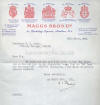
1940 - 20th March, Maggs Bros. Ltd., 50 Berkeley Square, London W.1.
Professor E. H. Alton, Trinity College, Dublin, Dear Sir, We thank you for
your kind order of the 19th March, and as designed have to-day dispatched to
you item no. 245 from our catalogue 687 - Ovidius, Epistolae, for which we
enclose invoice herewith. Yours faithfully, pp Maggs Bros., Ltd. E. J.
Fleury


1942 - 19th December, Provost's House, Trinity College, Dublin, Mr. Dear
Gerald, Life is full of chances, and I am scribbling a line of suggestions
in case they might be called for regarding my affairs. We have had very
heavy claims on us through illness (Charles etc.) and this year the move to
the P.H. has not bee easy or cheap. I think you will find that between
Insurance and savings my total capital (exclusive of 5 Dartmouth Road, which
was bought nearly all with Marjory's money), will amount to about £4/5000,
less rather than more. As regards real property, well, I cannot assess the
value of the furniture. On the books I can speak, and I think Blackwell of
Oxford (the straightest man in the book trade) would give between £400 &
£500; if I live to get my legs under me, I'd like to give a gift of MSS &
Aldines to the College Library; in any case, I'd like the MSS to go there. I
have borrowed certain periodicals from the library which must be returned,
viz., American Journal of Philosophy, Philological Quarterly, Studies in
Philology. In addition to these three I have the Leyden Collotype of
Propertius (a big volume, in the press in the telephone room). These should
be retuned at once. If money must be made out of my books, DO NOT SELL
PIECEMEAL - you will lose heavily by so doing - Confidential strictly
private, Gerald Grove-White, Esq.
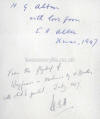
1947 - H. G. Alton with love from E. H. Alton, Xmas 1947 - From the
flyleaf of Wayfarers in Medicine by W. Doolin, with which I parted July 1957
H. G. A.

1948 - H. G. Alton from E. H. Alton Xmas 1948
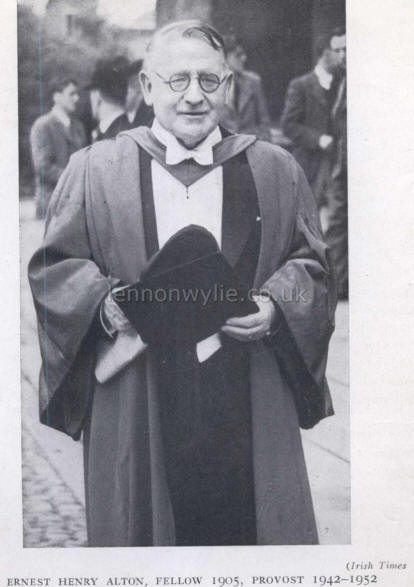
Ernest Henry Alton, Fellow 1905, Provost 1942-1952 (Irish Times)
From The Trinity - Ernest Henry Alton - On the morning of the eighteenth
day of February last the great bell of College spoke again. It had been
tolling a while back for Sir Robert Tate, and then for King George, and now
it tolls for the passing of the Provost. The Provost died to-day. Our friend
is gone. A chapter of College history closes. The man and his College were
one. His life-story was (to use the title of one of his opuscula) a
fragment of College history. Let me treat it so.
Ernest Henry, eldest son of James Poë Alton, was born on the 21st of
September, 1873. From the High School, Dublin, he entered Trinity in 1892
when the tercentenary celebrations were ending. He worked with two
hands. Studying classics and philosophy, he won first classical scholarship
in 1894, annexed the chief prizes of both schools, and graduated in 1896
with Senior Moderatorships in both his subjects, becoming classical student
of his year. Alton had much philosophical knowledge, but little of the
philosophical temperament. And that was a pity. Had he seriously practised
the Know Thyself, preached by Delphi and Descartes, his fine
intellect would have gained enormously in grip and thrust. As it was, memory
took control, and the range and speed of his memory were amazing. His
working metaphysic and ethic were simple; he believed in God and the Church
of Ireland, and he loved the classics and his fellow-men. From his
studentship to fellowship was a long, long road. Reacting against books he
went to London and tried his hand at journalism; there he fell ill.
Recovering from the fever and the journalism, he returned to Dublin, and
settled down to read for fellowship. The examination, open to almost all
comers, was reputed one of the stiffest tests in the world. The system had
merits; but it did not suit all candidates; it was fair and objective; it
produced a succession of fine scholars; but it would be an anachronism in
the complex life of a university to-day. From the yellowing pages of the
book of Candidates for Fellowship I have transcribed the following
signatures, which, like stones from the river-bed of Jordan, may serve to
show us the way we have come. I have starred the Fellow elected.
Candidates for Fellowship:- 1899, R. A. P. Rogers, John Fraser, W. Kennedy,
L. H. Gwynn*, E. H. Alton, W. A. Goligher; 1900, R. A. P. Rogers, John
Fraser, E. H. Alton, W. Kennedy*; 1901, R. A. P. Rogers, John Fraser, E. H.
Alton.
So the mill turned. Once a year the one was taken, the others left. The
grind was far from soulless, and it had great rewards - the disciplined and
focussed mind, the steeled will, and the golden harvest of learning. Even
defeat had a silver lining. There were goodly fellowship-prizes; and the
princely Madden, won once by Alton, was regarded as worth more than the
fellowship itself. In 1905 his long ordeal was over, and Alton entered the
golden gates. He entered a learned man, a scholar to his restless
finger-tips, fiercely in love with the College, hating fiercely the
fellowship-examination system. Rebels were needed, for College was changing
fast. The women had gate-crashed in 1904. Mathematics and classics were
losing ground, and many new subjects were knocking at the door. In 1911 the
Council and the Board were re-constituted, and a few years later the
fellowship system was re-cast. Alton was in the thick of all the fights
represented by these facts. The first world war almost emptied our
class-rooms, and paralysed for a time the work of the College. Then came
'the troubles' and the treaty and drastic political changes. The new
constitution of the Board had its baptism of fire, and proved its worth.
Holding the balance between the old and the new, it reflected with fair
accuracy the state of College opinion, and responded remarkably quickly to
the dramatic peripeteia of those days. Moving with the times, the
College gradually adjusted itself to the changed conditions and the
evolution of the new Ireland. At this period Alton's best work for the
College was done in the field of public relations. He entered the Parliament
that was subsequently Dáil Éireann in 1921 as a representative of the
University, and when in 1937 that university representation was abolished,
he represented us in the Senate till shortly after his appointment as
Provost in 1942. Occasionally he intervened in the debate, but his true
métier lay in the committee-room, in social gatherings, and
heart-to-heart conversation. In the council-chamber he was ineffective, but
in the small circle his genial presence warmed the air, radiating good
temper and good nature; his personal charm conciliated extremists, and won
us many friends. He helped to effect a silent revolution in outside
sentiment towards Trinity, and the full extent of our debt to his
peace-making probably we shall never know. As a classical scholar he
maintained our high traditions. He became the acknowledged authority on
Ovid's Fasti, and made important discoveries about the text. He published
papers, but he never put the finishing touch to the work as a whole, and his
magnum opus is for others to write. Several of his old pupils have spoken
appreciatively of his tutoring. He must have tutored better than he (or we)
knew. He was never a 'big tutor', and was proud of the fact; for he thought
that success in tutoring and in scholarship were inversely related. He loved
to pretend that the College authorities were down on his few sheep, just
because they were his. 'Stick him', he once cried to a Senior Lecturer,
'stick him; he's my pupil'. Alton's provostship is too recent for
ready assessment. The outstanding College event of his ten years' tenure was
the award of the first large-scale Government grant. In this matter he had
the first large-scale Government grant. In this matter he had light at
eventide; for only a few days before his death he waited on the Taoiseach
and heard the welcome news of a handsome increase in the amount. Much of his
leisure time was spent in the muniment room among the records of our early
days. There he discovered and calendared many forgotten documents.
Carpent tua poma nepotes. He had no chance as Provost to make College
history himself. During the first portion of his reign the world war was
raging; new policies and constructive measures were out of the question.
Then came his long and serious illness, and though he recovered health, he
never recovered grip. He looked the part of Provost, and in dignity and
poise he never failed. Leo Whelan's portrait of him has caught the
dignitas. His handsome presence and massive features, and broad Olympian
brow marked him for command, and, on the whole, he ruled well. He made
mistakes, but he ruled well. He ruled without the rod; he ruled by tact and
knowledge of men and by sympathy. He was tolerant of opposition, rarely
ruffled in debate, and at all times he was considerate for the feelings and
interests of others. We repaid him with loyalty and love. Greater Provosts
there have been but none more loved. The funeral, attended by the Provident
of Eire, was a striking tribute of personal affection. We were a long
procession, not of official mourners, but of bereaved persons. Fellows and
professors, readers and lecturers, scholars and students, all in cap and
gown, and the porters in uniform, and the skips - we all felt it; our hearts
were hushed, and we held out our hands to him, as the great bell tolled, and
the last sad pomp moved slowly from the Provost's House, over the
cobblestones of the Front Square, alongside the Library, and around the
courts of his College to the House of God. A. A. Luce
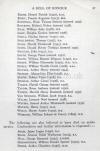
a page from The Trinity listing part of Roll of Honour
Roche, Gerard Patrick (1935) B.A.I.; Roddy, Francis Augustus (1913) M.B.;
Rothwell, Brian Thomas Stewart (entered 1939); Roycroft, Richard Nelson
(entered 1938); Ryan, William Astle (1928), M.B.; Shaw, Douglas Gordon
(entered 1906); Sheill, Gordon Spencer (1937), M.B.; Shillington, Thomas
(1937), B.A.; Sloan, Harold FitzGerald (1935), M.B.; Smith, Donald Hector
Tresham (entered 1937); Smullen, John (1941), B.A.; Smyth, George Paton
(entered 1932); Smyth, William Bennett Megarry (1940), B.A.; Speedy, William
Dinwoodie (1922), M.B., M.A.; Steele, William Neville Curtis (1926), B.A.I.;
Stevens, Arthur Henry (entered 1942); Stewart, Alexandrina Elise (1926),
B.A.; Stoney, Robert Vesey (1926), B.A.; Strahan, Arthur Conan (1926), B.A.;
Talbot, Harold George (entered 1936); Taylor, Brian Anthony (entered 1930);
Tuckey, Derrick Henry Broderick (entered 1939); Van Stockum, William Jacob
(1933), B.A.; Walsh, Leonard Noel (entered 1938); Waters, Samuel Arthur
Wentworth (entered 1939); Watson, Henry (1931), LL.B.; Wells, Hayter Arnett
(1933), M.B.; Wheeler, William Ireland de Courcy (1899), M.D. - The
following are also believed to have died on active service. Confirmation and
further information is requested:- Adair, James Logan (1940), B.A.; Birch,
Edward Noble Warburton (1913), B.A.; Hall, George Raymond (1932), B.COMM.;
Higginbotham, William Harold Spencer (1932), M.A.; Prigge, Arthur Chambers
(1936), M.SC.

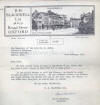
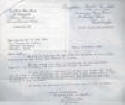
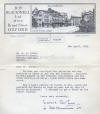


1952 - Ob. 18th February Chapel of Trinity College, Ernest Henry Alton,
Provost
1952 - 19th February B. H. Blackwell Ltd., 48 to 51 Broad Street,
Oxford to The Executors of the late Dr. E. Alton, Provost's Lodgings,
Trinity College, Dublin, Eire. Dear Sirs, We were indeed sorry to hear of
the death of Dr. Alton, who has been a good friend of this firm for so many
years. If you should desire to sell his library, we should be ready to make
an offer for the books. We are licensed valuers for Probate and could
arrange the matter for you at the same time, for which, if our offer were
accepted, we should make no charge. We are yours faithfully, B. H.
Blackwell, Ltd. Basil Blackwell, Director
1952 - 19th February Deighton, Bell & Co. Ltd., Incorporating Elijah
Johnson, 13 Trinity Street, Cambridge To The Executors of the late Dr.
Ernest H. Alton, Trinity College, Dublin, Eire. Dear Sirs, We beg to enquire
if you wish to dispose of any books belonging to the late Dr. Ernest H.
Alton. We buy large or small collections in all subjects, English and
Foreign, and pay highest market prices. If you are in a position to offer
any books for sale, ,ay we send a representative to inspect and value them
with a view to purchase, or for purposes of Probate? All books bought are
removed at our expense. We shall be pleased to hear from you in due course.
Yours faithfully, Deighton Bell & Co. Ltd. ? Director
1952 - 8th April B. H. Blackwell, Ltd. to Dr. H. G. Alton, Provost's
House, Trinity College, Dublin Dear Dr. Alton, We have now completed the
valuation and are prepared to offer £1,235 for the library. Included in this
amount is the Analecta Bollandiana and the Irish Statutes at Large, about
which there was some doubt. May I again express my thanks to Mrs. Alton and
yourself for making my task so easy and my stay in Dublin so pleasant.
I managed to get a berth on the return journey. Yours very sincerely, Edward
A. East
1952 - 16th April B. H. Blackwell, Ltd. to Dr. H. G. Alton, Provost's
House, Trinity College, Dublin Dear Dr. Alton, Thank you for your letter of
12th April, accepting our offer. It included the Aldines, but the books
selected by Dr. Wormell were excluded. We have received a litter from Dr.
Parke about the Aldines, and we will quote him on these when they arrive
here, as it seems that the Library will only be in a position to purchase
some of them. With regard to the books which Mrs. Alton wishes to keep,
perhaps you could make a list of these. The chances are that it will make no
difference to the amount. We allowed £3 10/- for the Irish Statutes. We
agree that perhaps they would find a more ready sale in Dublin. We are
writing to Mr. Figgis confirming that we shall require his services. Yours
very sincerely E. A. East,
1952 - 15th May B. H. Blackwell, Ltd. to Dr. H. G. Alton, c/o
Provost's House, Trinity College, Dublin Dear Dr. Alton, Thank you for your
letter of May 3rd. The 47 cases have now arrived. Messrs. Hodges Figgis did
a very good job with the packing. The odd volumes of the Royal Irish Academy
and the photograph albums were not included in our valuation. The books
withdrawn are about balanced by the extra volumes which we did not see, and
we have pleasure in enclosing out cheque for £1235 (One thousand, two
hundred and thirty-five pounds) Yours very sincerely E. A. East

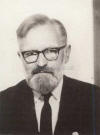
1994 - May, Copy of my Will, original with Adrian Christmas? (Solicitor),
Peterborough. Should be revised soon as possible 31/10/97 H. G. Alton
This is the Last Will and Testament of me Henry Gordon Alton of (address
withheld) which I make this 2nd day of May 1994.
1. I revoke all former Wills made by me and declare this to be my last Will.
2. I appoint as Executrix of this my Will Sandra Mary Hudson of (address
withheld)
3. I desire that my medical and other books be dealt with at the discretion
of my Executrix
4. Subject to the payment of my just debts funeral and testamentary
expenses, I leave all my real and personal property whatsoever and
wheresoever to the Royal Medical Benevolent Fund of 24 Kings Road,
Wimbledon. SW19
In witness whereof I have set my hand the day and year first before written.
Signed H. G. Alton
+++++++++++++++++++++++++++++++++++++++++++++++
Dora A. Alton
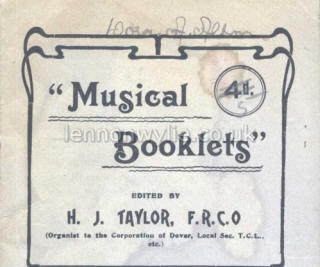
Dora A. Alton Musical Booklets








Dora A. Alton, 4 Herbert Street, Dublin
Autographs 1927; MacDonald 1927; 1945






Autograph Album belonging to Dora A. Alton, 4 Herbert Street, Dublin
Edwin Fischer, 1949; 1978; Anthony Pim

 


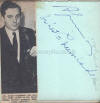

Priestley 1946; Harris; 1950; Arthur Grumiaux
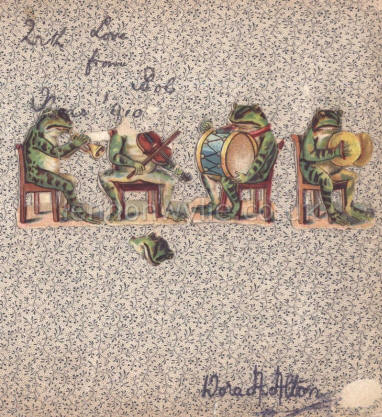 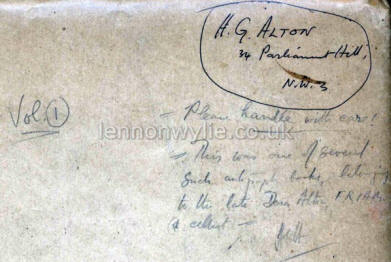
Autograph Album belonging to Dora A. Alton from Bob Xmas 1910
H. G. Alton, 34 Parliament Hill, N.W. 3 Vol. 1, Please handle with care!
This was one of several such autograph books, belonging to the late Dora
Alton FRIAR? H. G. A.
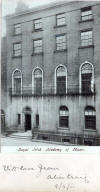







Royal Irish Academy of Music, With love from Alice Craig, 4/4/11 - 28th Feb.
1911 - Dublin 1932 - December 1915 - Hamilton Harty April 1911 - Agnes
Nicholls Harty 1913 - Wilson, 15th May 1919 - Frederick Dawson - York Bowey?
- 1924








Nellie Melba - 1925 - Joseph O'Mara - Percy C. Hull - John Coates 1912 -
Regards of Wells Fargo Charles Magrath 1912 - Solomon Rosenberg 1912








Antoni Sala 1932 - Howard Ferguson - Clyde 1911 - Henry J. Wood - Thomas
Beecham - Dublin 1924 - Lener (String) Quartet Lener, Smilovits, Roth &
Hartman - Walter Horton, Briggs, Adolph Brodsky, Spackman - Dublin 1915





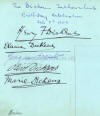

J. Shaw, Ivanhoe, Skerries, Co. Dublin 1907 - The Council of the Dickens
Fellowship







Dickens Fellowship Birthday Celebration 1908 - Joseph Campbell 30th April
1910 - Eileen Preston, Fairmount, Monday August 1st, 1909 - L. Carr Shaw,
Mother of G.B.S. - E. J. Elliott, Vice President Belfast Bank - A. Tennyson
Dickens, The Gresham Hotel, Dublin, Tuesday 15th October 1910 - Cats Mike ?
7th March 1901
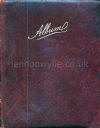


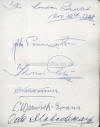




Dora Alton, 4 Herbert Street, Dublin - Lener String Quartet - The
London Quartet - Temianka 1934 - Maud Aikin - Arthur Schnabel 1939 - Gaspar
Cassado, Gerald Moore
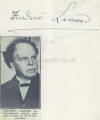


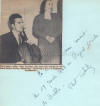
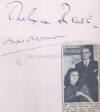


Frederic Lamond - Loewenguth String Quartet - Signor Arturo Bonucci & Ernest
Lush - Paul Tortelier 1948 - Thelma Reiss & Angus Morrison - Griller String
Quartet 1944 - Yehudi Menuhin |







































































































